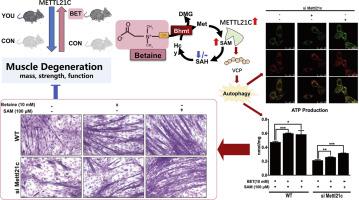The Journal of Nutritional Biochemistry ( IF 4.8 ) Pub Date : 2023-12-24 , DOI: 10.1016/j.jnutbio.2023.109555 Si Chen 1 , Jiedong Chen 1 , Chen Wang 1 , Tongtong He 1 , Zhijun Yang 1 , Wenge Huang 2 , Xiaolin Luo 3 , Huilian Zhu 1

|
Age-related impairment of autophagy accelerates muscle loss and lead to sarcopenia. Betaine can delay muscle loss as a dietary methyl donor via increasing S-adenosyl-L-methionine (SAM, a crucial metabolite for autophagy regulation) in methionion cycle. However, whether betaine can regulate autophagy level to attenuate degeneration in aging muscle remains unclear. Herein, male C57BL/6J young mice (YOU, 2-month-old), old mice (OLD, 15-month-old), and 2%-betaine-treated old mice (BET, 15-month-old) were employed and raised for 12 weeks. All mice underwent body composition examination and grip strength test before being sacrificed. Betaine alleviated age-related decline in muscle mass and strength. Meanwhile, betaine preserved the expression autophagy markers (Atg5, Atg7, LC3-II, and Beclin1) both at transcriptional and translational level during the aging process. RNA-sequencing results generated from mice gastrocnemius muscle found Mettl21c, a SAM-dependent autophagy-regulating methyltransferase, was significantly higher expressed in BET and YOU group. Results were further validated by qPCR and western bloting. In vitro, C2C12 cells with or without Mettl21c RNA interference were treated different concentration of betaine (0 mM, 10 mM) under methionine-starved condition. Compared with control group, betaine upregulated autophagy markers expression and autophagy flux. By increasing the SAM level, betaine facilitated trimethylation of p97 (Mettl21c downstream effector) into valosin-containing protein (VCP). Increased VCP promoted autophagic turnover of cellular components, ATP production, and cell differentiation. Knock-down of Metthl21c dismissed improvements mentioned above. Collectively, betaine could enhance aged skeletal muscle autophagy level via Mettl21c/p97/VCP axis to delay muscle loss.
中文翻译:

甜菜碱通过 Mettl21c/p97/VCP 轴减轻自噬中与年龄相关的抑制,以延缓肌肉流失
与年龄相关的自噬损伤会加速肌肉流失并导致肌肉减少症。甜菜碱可以通过增加蛋氨酸循环中的 S-腺苷-L-蛋氨酸(SAM,自噬调节的关键代谢物)作为膳食甲基供体来延迟肌肉流失。然而,甜菜碱是否可以调节自噬水平以减轻衰老肌肉的退化仍不清楚。在此,使用雄性 C57BL/6J 年轻小鼠 (YOU,2 个月大)、老年小鼠 (OLD,15 个月大) 和 2% 甜菜碱处理的老年小鼠 (BET,15 个月大) 并饲养 12 周。所有小鼠在被处死前都进行了身体成分检查和握力测试。甜菜碱缓解了与年龄相关的肌肉质量和力量下降。同时,甜菜碱在衰老过程中在转录和翻译水平上保留了表达自噬标志物 (Atg5 、 Atg7 、 LC3-II 和 Beclin1)。小鼠腓肠肌产生的 RNA 测序结果发现 Mettl21c,一种 SAM 依赖性自噬调节甲基转移酶,在 BET 和 YOU 组中表达显著升高。通过 qPCR 和 western bloting 进一步验证了结果。体外研究 /在蛋氨酸饥饿条件下,处理不同浓度的甜菜碱 (0 mM, 10 mM) 有或没有 Mettl21c RNA 干扰的 C2C12 细胞。与对照组相比,甜菜碱上调了自噬标志物表达和自噬通量。通过增加 SAM 水平,甜菜碱促进 p97 (Mettl21c 下游效应子) 三甲基化为含缬氨酸的蛋白 (VCP)。VCP 增加促进了细胞成分的自噬更新、ATP 产生和细胞分化。Metthl21c 的敲低忽略了上述改进。 总的来说,甜菜碱可以通过 Mettl21c/p97/VCP 轴提高衰老骨骼肌自噬水平,以延缓肌肉流失。































 京公网安备 11010802027423号
京公网安备 11010802027423号